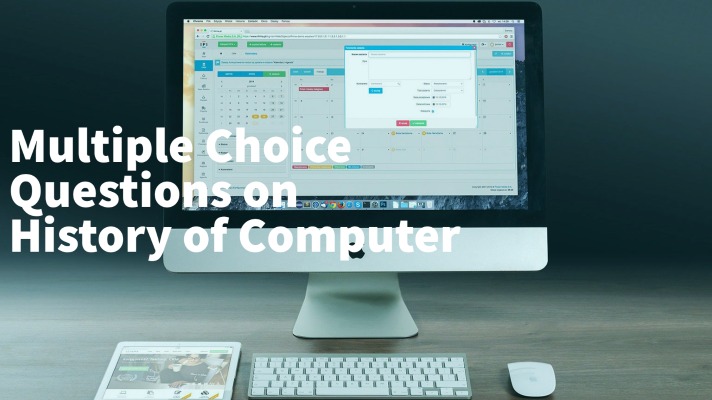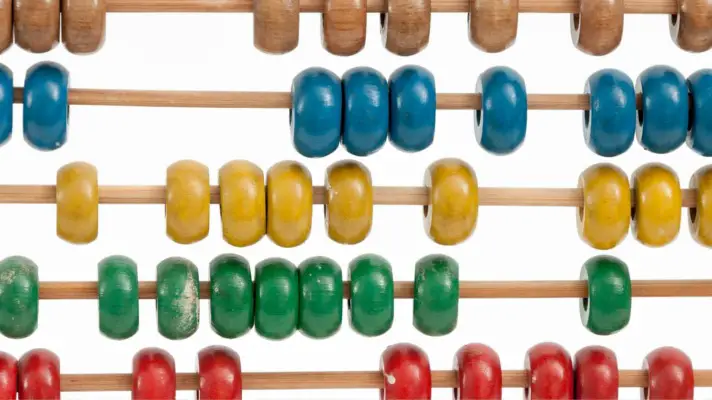Are you searching for Multiple-Choice Questions on History of Computers? Then go ahead. Here, in this article, I will brief you about the Evolution of Computer through some MCQ questions.
There is also a test for you so that you can evaluate yourself. Thus, you will learn a lot about Computers. I will suggest that you read the text first and then appear for the test.
At the end of this article, by clicking on the “PDF” button, you can download the MCQ sheet. Now let us start the Multiple Choice Questions on History of Computers.

MCQ on History of Computer
- Which country used abacus first?
- America
- England
- China ✔️
- None of these
- In China, Suan-Pan means
- Abacus ✔️
- Computers
- Difference Engine
- None of these.
- In Japan, Soroban means
- Computers
- Abacus ✔️
- Difference Engine
- None of these.
- Abacus is used for :
- for drawing pictures
- for painting
- for performing calculations ✔️
- all of these
- Pascaline was invented in:
- 1842
- 1742
- 1642 ✔️
- 1542
- Pascaline is invented by:
- John Napier
- Charles Babbage
- Blaise Pascal ✔️
- None of these
- Napier Bones is a device that helps in
- painting
- drawing
- calculating ✔️
- none of these
- Napier Bones is a device invented by:
- John Napier ✔️
- Charles Babbage
- Blaise Pascal
- None of these
- Difference Engine is a device invented by:
- John Napier
- Charles Babbage ✔️
- Blaise Pascal
- None of these
- Difference Engine is a device invented in___.
- 1622
- 1722
- 1822 ✔️
- 1922
- Who is known as Father of Computers?
- John Napier
- Charles Babbage ✔️
- Blaise Pascal
- None of these
- Analytical Engine was invented in:
- 1833 ✔️
- 1733
- 1633
- 1533
- From which year, use of Integrated Chip had been started?
- 1664
- 1764
- 1846
- 1864 ✔️
- GUI stands for
- Graphical User Interface ✔️
- Graphical Unix Integrator
- Graphical Unix Interface
- None of these
- ENIAC stands for:
- Electronic Numerical Integrator and Calculator
- Electronic Numerical Interface and Calculations ✔️
- None of these
- The first computer language is:
- Fortran
- C++
- C
- COBOL ✔️
- UNIX is a / an______
- software
- name of a Computer
- operating system ✔️
- a language
- Who invented Apple Computers?
- Charles Babbage
- Douglas Engelbart
- Steve Jobs ✔️
- None of these
- In which year Apple computers was invented?
- 1876
- 1867
- 1976 ✔️
- 1967
- The first modern computer called the Z1 was created in ____.
- 1903
- 1930 ✔️
- 1985
- 1958
Quiz on Evolution of Computers
Here is the quiz for you. Don’t miss it. Best of luck!
If you want to know the explanations behind the answers of the MCQ questions, then please scroll down and read the following text.
Overview
At present, we use computers for various purposes. They are versatile and can do multiple works at a time. They can work very fast.
The word ‘computer’ is derived from the word ‘compute’, which means ‘to calculate’ or ‘to estimate’.
History of Computer
People used a number of devices that were invented over a period of time to estimate numbers and equations.
Abacus

China first used one type of counting device which is named Abacus. The Chinese call it Suan-Pan.
The device that was made of woods with metal ri-enforcements had beads on the rods/strings which is mounted inside a wooden frame.
The difference between Abacus and Calculator is that the latter counts itself but the former does not count itself.
In Japanese, the Abacus is called ‘Soroban’.
There are stores of Abacus in China where merchants still use an Abacus to tally a customer’s bill. It is still taught in Asian schools.
Blind children are taught to use the Abacus for performing calculations. It was used for addition, subtraction, multiplication, and division.
The Abacus, a portable computing device, continued to evolve into the electronic digital calculators. Then, the scientific calculators evolved into programmable calculators.
Pascaline
Blaise Pascal invented the Pascaline, an Arithmetic Machine in 1642.
Pascal wanted to help his father in the collection of Taxes. So, he developed this machine.
The machine had wheels, gears, and dials.
This machine could perform addition or subtraction with numbers that are entered by manipulating its dials.
Napier’s Bones
A Scottish mathematician and scientist, John Napier invented an calculating device, named as ‘Napier’s Bones’. This device helps in multiplication.
9 numbers of different bones or stripes are there and numbers are mentioned there. When the multiplicand is a long number and multiplier is of the single-digit number, this device helps in calculating.
Difference Engine
A British Mathematician, Charles Babbage who invented the” Difference Engine” in 1822 is the Father of Computers.
This device which solved mathematical equations called polynomials consists of a number of columns, numbered from 1 to N.
Analytical Engine
In 1833, Charles Babbage invented the “Analytical Engine”, the first mechanical general-purpose computer.
There is an arithmetic logic unit which controls flow in the form of conditional branching and loops and integrated memory.
Five sections of this engine are Input, Output, Store, Mill, and Control.
Someone could give the input data through punched cards and could use Mills for calculating. The purpose of Stores was to store data and of Control was to supervise other units.
Lady Augusta Ada Lovelace, an English mathematician, and writer who was the first programmer to suggest the use of Binary data (0 and 1) instead of the decimal number system.
Evolution of Computers
The evolution of computers is classified into five generations. A major technological development changes the operation of computers in each generation and thus promotes it to the new generation.
Thus, it progresses a lot. There are some major changes which are visible are increase in ‘speed’, ’storage capacity’, and reliability.
In 1930, the first modern computer was created which was called the Z1. In 1940, computers took up entire rooms like the ENIAC which was called a mathematical Robot.
From 1964, use of Integrated Chips (IC) had been started.
Generations of Computers
| Name of Inventor | Year of Evolution | Inventions |
| Joseph Marie Jacquard(In France) | 1801 | a loom that uses punched wooden cards to automatically weave fabric designs. |
| Charles Babbage( English Mathematician) | 1822 | Steam driven calculating machine |
| Herman Hollerith | 1890 | a punch card system to calculate the 1880 census |
| Alan Turing | 1936 | Turing machine which can compute anything that is computable |
| David Packard and Bill Hewlett | 1939 | Hewlett-Packard |
| Atanasoff, Clifford Berry | 1941 | design a computer that can solve 29 equations simultaneously |
| John Mauchly and J. Presper Eckert | 1943-1944 | Electronic Numerical Integrator and Calculator (ENIAC)- the grandfather of digital computers, it fills a 20-foot by 40-foot room and has 18,000 vacuum tubes. |
| William Shockley, John Bardeen and Walter Brattain of Bell Laboratories | 1947 | Transistors which removed the need of vacuum. |
| Grace Hopper | 1953 | The first computer language,COBOL |
| a team of programmers at IBM led by John Backus, according to the University of Michigan. | 1954 | The FORTRAN Programming language |
| Jack Kilby and Robert Noyce | 1958 | The integrated circuit, the computer chip. Kilby was awarded the Nobel prize in Physics in 2000 for his work. |
| Douglas Engelbart | 1964 | a prototype of the modern computer, with a mouse and a graphical user interface (GUI) |
| A group of developers at Bell Labs | 1969 | UNIX, an operating system. |
| Steve Jobs and Steve Wozniak | 1976 | Apple Computers |
The multiple-choice questions mentioned here are the basic questions from the chapter- “Evolution of Computer”. Hence, it will help the students of class five.
You may consider the quiz as a test of 25 marks. After completion of the test, you can check the answers by yourself so that you can come to know how much you are prepared for this chapter- “Evolution of Computers”.
I hope that you got interest in studying ‘Evolution of computers’ and appearing for the test. It will also help you for taking preparation for competitive examinations. Best wishes!



Thank You for Computer History Question
thank you